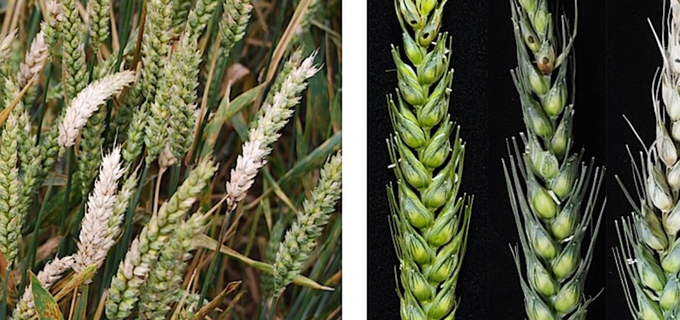June 22, 2025 | 09:17 GMT +7
June 22, 2025 | 09:17 GMT +7
Hotline: 0913.378.918
June 22, 2025 | 09:17 GMT +7
Hotline: 0913.378.918

Photo Credit: Rothamsted Research.
Researchers have found a protein that causes disease in wheat crops and is one the most significant contributors to crop yield declines.
According to Phys.org, fungal diseases are among the five contributing factors to yield and quality loss. The protein Knr4 is a key component in making these diseases so deadly.
A research team at Rothamsted Research, the University of Bath, and the University of Exeter looked at the most present genes during infection. To identify the protein Knr4, they looked at 14,000 genes.
Phys.org relayed that the team identified "Knr4 as a critical driver of infection for Fusarium Head Blight (FHB) and Septoria tritici blotch (STB) — two of the most common diseases of wheat."
Study lead Dr. Erika Kroll said, "This protein is only found in fungi, not in plants or animals,"
The team found that removing Knr4 from Fusarium took away its ability to spread in wheat.
Phys.org noted the protein could be removed by developing "chemical fungicides that disrupt the protein's function or through the application of RNA interference techniques that would reduce fungal gene expression."
Dr. Kroll said that targeting Knr4 would reduce the fungi's effectiveness while not "harming the wheat crop, ourselves, or other animals."
The team's findings were published in BioRxiv.
Fungal diseases can cause toxins that harm humans. According to the University of Bath, this is a growing European problem. The fungus causes mycotoxins.
The university noted, "Eating products contaminated with mycotoxins causes sickness in humans and livestock, such as vomiting and other gastrointestinal problems."
It can also cause problems for farmers because the crop loses its value. It's a concern for the global food supply, so finding a way to eliminate the fungus would help with food security.
Dr. Kroll said, "This could be a game-changer for controlling these serious pathogens."
Fungi are not the only threat to food security. Droughts also pose a threat. A 2023 report showed that almost a quarter of the world's population lived under drought conditions.
You can explore critical climate issues to learn more about the threats to food security.
TCD
![Turning wind and rain into action: [11] Ten years before storms, after every harvest](https://t.ex-cdn.com/nongnghiepmoitruong.vn/608w/files/news/2025/06/20/z6704423696987_15fd32ffc26d590d204d520c9dac6786-nongnghiep-140922.jpg)
(VAN) With WeatherPlus, every raindrop and every breeze carries a message. And if we learn to listen, the fields will no longer live in fear of the weather.
![Turning wind and rain into action: [10] Advancing accessible climate services for farmers](https://t.ex-cdn.com/nongnghiepmoitruong.vn/608w/files/linhnhp/2025/06/20/1911-z6704423696987_15fd32ffc26d590d204d520c9dac6786-nongnghiep-161854.jpg)
(VAN) Not only does it help farmers 'avoid droughts and rains,' the development of agricultural climate services also enhances their ability to proactively adapt to a rapidly changing climate.

(VAN) With international assistance, the harvesting of sargassum seaweed in Quang Ngai has become increasingly regulated, thereby safeguarding marine life and ensuring the stability of coastal communities' livelihoods.

(VAN) On June 19, the United Kingdom officially became a Development Partner of the Mekong River Commission.

(VAN) Biodiversity is being threatened by traditional remedies made from wildlife. Traditional medicine and humans must change to live in harmony with nature.

(VAN) Agrifood investment and finance solutions for people and the planet.

(VAN) Microplastic contamination has become pervasive in seafood, posing unprecedented challenges for food safety and marine ecosystems.